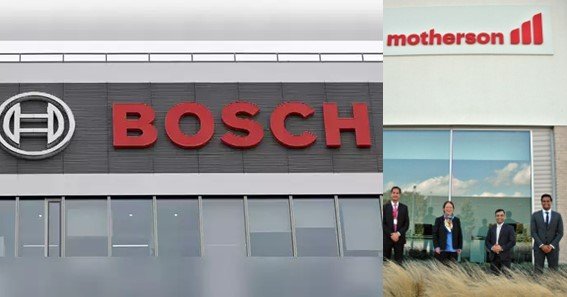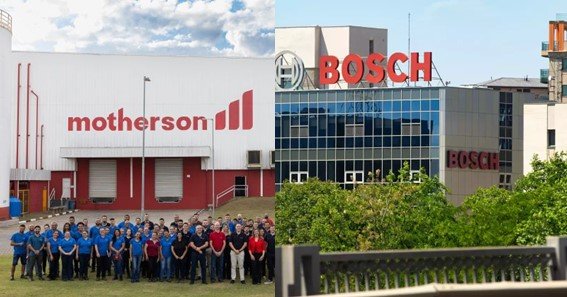Samvardhana Motherson and Bosch India are two of the most prominent players in India’s auto components industry. While both companies serve the global automotive sector, they have distinct strengths, market strategies, and growth trajectories. This article provides an in-depth comparison of Samvardhana Motherson vs Bosch India, highlighting their business models, market presence, and financial metrics to understand how they stack up against each other.
Company Profiles
Samvardhana Motherson International Ltd. (SAMIL)
Founded in 1986, Samvardhana Motherson is a global leader in automotive components, particularly in wiring harnesses, rearview mirrors, and polymer-based modules. The company has a strong focus on acquisitions, which has allowed it to expand its global footprint across 41 countries, serving top-tier clients like BMW, Volkswagen, and Mercedes-Benz. With its aggressive acquisition strategy and focus on technological innovation, Samvardhana Motherson has become one of India’s largest auto component manufacturers.
Bosch India
Bosch, a German engineering and technology giant, has a long-standing presence in India. Bosch India focuses on various sectors, including automotive technology, industrial products, and consumer goods. In the auto sector, Bosch is known for its high-tech automotive systems, especially in electric vehicle (EV) components, fuel injection systems, and advanced driver assistance systems (ADAS). The company is deeply invested in R&D, ensuring that it stays at the forefront of technological advancements.
Financial Comparison
Revenue and Profitability
Bosch India has a more diverse revenue stream due to its involvement in multiple industries beyond automotive components. However, Samvardhana Motherson’s growth has been particularly strong in the auto sector, where it has leveraged global partnerships and acquisitions to drive expansion. As of 2024, Bosch India has a better price-to-earnings (P/E) ratio of 39.92 compared to Samvardhana Motherson’s 48.20, suggesting that Bosch may offer better value for investors(
Market Capitalization
While both companies are giants in the Indian stock market, Bosch India holds a premium position due to its diverse business lines and strong financial stability. In contrast, Samvardhana Motherson’s valuation is more concentrated in the automotive sector, making it highly dependent on the performance of the global auto industry.
Dividends and Shareholder Returns
Bosch India boasts a higher dividend yield (1.11%) compared to Samvardhana Motherson’s (0.41%), which is a reflection of Bosch’s more stable financial returns and diversified business model. This makes Bosch a more attractive option for investors looking for consistent returns.
Innovation and R&D
Samvardhana Motherson
Samvardhana Motherson is known for its innovation in electric vehicle components and its commitment to sustainable automotive solutions. The company has recently increased its R&D spending, focusing on advanced driver assistance systems (ADAS) and smart mobility solutions.
Bosch India
Bosch India has been a pioneer in automotive technology, investing heavily in electric vehicles, fuel-efficient systems, and AI-driven solutions for autonomous driving. With significant investments in local R&D, Bosch India plays a crucial role in developing innovative products tailored to the Indian market, particularly in EV technology.
Global Presence and Acquisitions
Samvardhana Motherson has grown significantly through its acquisition strategy, expanding into new markets and sectors. Its global reach spans over 41 countries, making it one of the most geographically diversified companies in the auto components sector. Recent acquisitions of companies like Dr. Schneider and Ichikoh Industries have further strengthened its position.
Bosch India, on the other hand, benefits from the global strength of its parent company, Robert Bosch GmbH. Bosch’s established global brand and extensive research network give it a competitive edge, particularly in high-tech automotive components.

FAQ
- Which company has a stronger global presence, Samvardhana Motherson or Bosch India? Samvardhana Motherson has a stronger presence in terms of acquisitions, with operations in over 41 countries. Bosch India benefits from its parent company’s global network, making both companies competitive globally.
- Which company is more profitable? Bosch India has a better price-to-earnings ratio and dividend yield, indicating stronger financial performance and stability compared to Samvardhana Motherson.
- Who leads in innovation? Bosch India, with its strong focus on R&D in electric vehicles and autonomous driving, leads in innovation. However, Samvardhana Motherson is rapidly catching up with investments in electric vehicle components.
- Which stock is more appealing to investors? Bosch India offers better dividends and lower valuation multiples, making it more attractive for investors seeking stability. Samvardhana Motherson, while growing, may be more volatile due to its focus on acquisitions.
- What are the future prospects for both companies? Both companies are well-positioned to benefit from the global shift towards electric vehicles. Bosch India, with its established R&D, may have an edge, while Samvardhana Motherson’s aggressive expansion strategy promises significant growth.
Disclaimer: This article is for informational purposes only and should not be considered investment advice. Please consult a financial advisor for specific recommendations.










